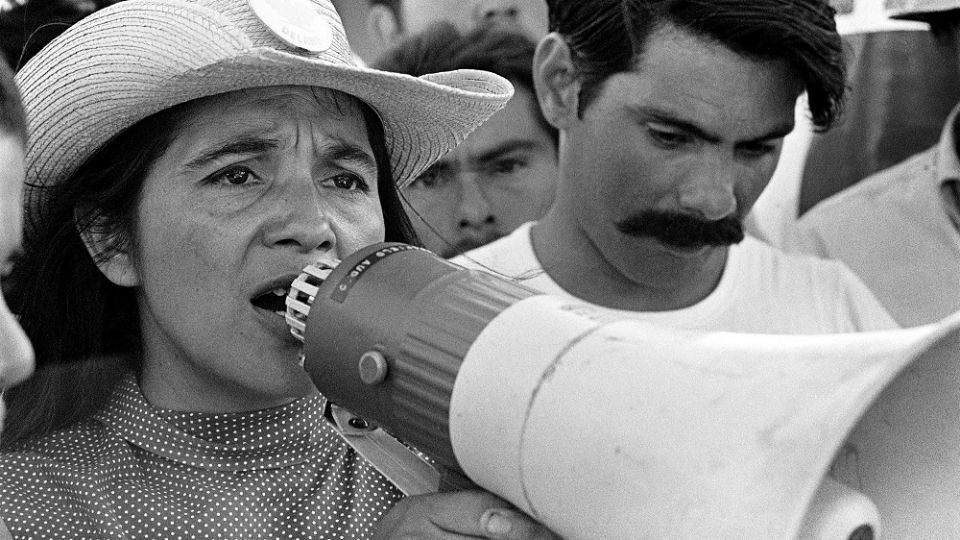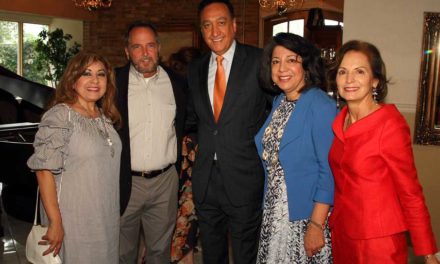Dolores Huerta is one of the most influential Latina leaders in America. A labor leader and community organizer, she co-founded the United Farm Workers (UFW) with Cesar Chavez , the first successful union of agricultural workers in the United States. As Vice President of the UFW, she advanced collective bargaining for workers and successfully promoted improvements in safety and health. Although retired from the UFW, she continues to serve as a strong advocate for children and women.
Dolores Huerta last spoke in San Antonio in 2015. Her epic story, which includes six decades of struggle for civil rights and social justice, is unparalleled in American labor history. I was honored to introduce her that evening at her lecture at the Briscoe Museum. She had been in many struggles since the first time I introduced her 37 years ago to students and faculty at a lecture at the University of California, San Diego.
Dolores Huerta grew up in Stockton, California where her mother ran a small hotel and cafe. Her mother, a native of Dawson, New Mexico, had moved to Stockton following a divorce. Dolores stayed in contact with her father who encouraged and inspired her. Stockton and much of California’s Central Valley was hard hit by the Dust Bowl and the Great Depression of the 1930s and most of the people she met growing up were poor farm workers.
Ms. Huerta studied to be a teacher and taught for a few years. But the families of the students she taught seemed to have so many difficulties, largely due to the instability of work and low wages paid to farm workers, she wanted to do more than teach. She searched for ways to help her students and their families. In the early 1950s, Fred Ross, one of America’s finest community activists, came to San Jose, California to organize the community’s poor neighborhoods. He recruited Cesar Chavez to organize in San Jose and later Dolores Huerta to work in the Central Valley for the Community Service Organization (CSO). Working in different communities, Chavez and Huerta registered people to vote and pushed for social and political reform.
In her work with the CSO, Dolores Huerta met with farm laborers, Mexican braceros, and mothers and children who labored in the fields and were in need of social services. Determined to help, she founded the Agricultural Workers Association (AWA) in 1960. About this same time, she met the new CSO director, Cesar Chavez.
When the CSO national leadership decided not to expand its services into farm workers’ communities, Huerta and Chavez left the organization. In 1965, they co-founded the United Farm Workers and devoted all their efforts to organizing and assisting California’s agricultural labor. In the late 1960s their battle was largely confined to California, however similar labor organizing efforts had started in Texas and parts of the Midwest.
I first met Dolores Huerta in the summer of 1970. That summer I had received permission from the Occidental College Upward Bound Program in Los Angeles to take a group of my social studies students to Delano, California, the center of grape strike activity for United Farm Workers.
For the past several years, we had been boycotting grapes to protest the poor working conditions of farm workers, and the Delano area was home to one-third of the largest grape growers in America. We arrived July 30 at midday, just in time to witness a small celebration of the previous day’s historic signing of an agreement between twenty-six grape growers and the UFW, effectively ending the strike.
As we got off the bus, farm workers handed us large bunches of grapes, a sign that everything was back to normal. The grape boycott had started in 1965, so our students were naturally nervous about consuming grapes. They were all young Latino and Black students from inner-city Los Angeles and some could not ever remember eating grapes, because grapes were considered a prohibited food because of the grape boycott. Dolores Huerta, one of the strike negotiating leaders, participated in the signing and celebration and everyone was excited about meeting her.
Over the next five years, 1970-1975, the UFW was at the center of additional strikes and stepped up its efforts to win state approval for their union. In 1975, the UFW achieved a major political victory with the passage of California’s Agricultural Labor Relations Act that guaranteed farm workers the freedom to join unions and bargain collectively. Chavez and Huerta’s concern for the safety and health of farmworkers led them to lobby against the use of dangerous pesticides such as DDT on farm crops.
Over the next twenty years, Huerta fought for comprehensive immigration reform, children’s health and safety, and social justice for minorities and the LGBTQ community. Her struggles were many and one in particular led to a near death encounter. At a political rally in San Francisco in 1988, police beat the 58 year activist into sub-consciousness, breaking six of her ribs and rupturing her spleen. She recovered fully and remained with the UFW for ten more years, retiring in 1999.
Dolores Huerta has been recognized by labor and women’s organizations as well as by political groups for her struggles for social justice. As the recipient of the Eleanor Roosevelt Human Rights Award from President Clinton in 1998 and the Presidential Medal of Freedom from President Obama in 2012, she is one of the few American women recognized by two U.S. Presidents.
Today, farm workers have the right to organize and bargain collectively and no longer have to labor in extreme summer weather without access to drinking water and toilets in the fields. In addition, they are protected from dangerous pesticides and airborne spraying of the fields while they labor in the agricultural fields. All of these gains required more than three decades of struggles by luchadoras like Dolores Huerta.
Dolores Huerta










